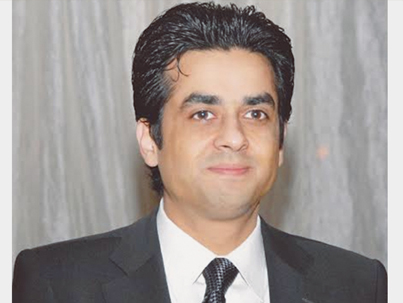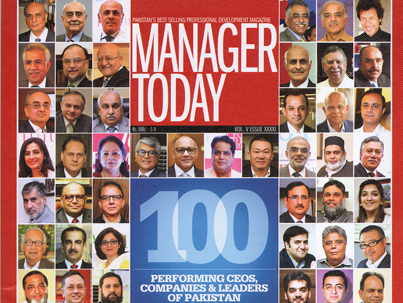
SYED SHEHARYAR ALI
Present in 419 towns, and cities of Pakistan and 30+ notable countries of the world, Treet Corporation Limited is Pakistan’s only blade manufacturer, having more than 80 percent local market share. Set up in 1952, it is a rapidly diversifying and expanding family business, which has been associated with illustrious names as Syed Maratib Ali and Syed Wajid Ali. The Executive director, Syed Sheharyar Ali, completed his studies at St. Louis University in the United States, returned to Pakistan in 2001 and became one of the youngest directors of Treet Corporation. At the age of 38, he manages a well-diversified portfolio consisting of manufacturing, healthcare, information technology, automobiles, sports and music.
HAPPINESS SHOULD BE MEASURED IN TERMS OF YOUR BEHAVIOUR AND RELATIONSHIP WITH YOUR FAMILY AND YOUR COLLEAGUES IN THE OFFICE. IF THEY ARE HAPPY WITH YOU AND YOU ARE HAPPY WITH THEM, IT MEANS YOU ARE REALLY HAPPY
CEO Club: Brief overview of your company, along with his history and diversified portfolio Sheharyar Ali:
The business was originally meant to be set up in India by my grandfather and great grandfather. After the partition of India, the company was launched in 1952, initially in Hyderabad and, later, in 1947, moved to Lahore, Pakistan. Since then, the business has continued to flourish, despite all the challenges and constraints. We are the only blade manufacturers in the country and our ranking is 3rdor 4th in the world in terms on quality. I am proud to say that, while Chinese everything in the world, they are still unable to make copy of our blade. In fact, until recently, China was the largest importer of our blades. Starting of with blades, we continued to expand and diversify our business. Now, in addition to blades, we are successfully handling the manufacturing and sale of soaps, shaving blades/disposable razors, corrugated packaging and assembling, and selling of motorcycles (including rickshaws). We have acquired 40 acres of land in Faisalabad to set up Pakistan’s first plant to manufacture maintenance-free sealed batteries. Besides, we are launching our own university of culture and arts at Raiwind Road, Lahore, in March 2017. In fact, we have grown substantially during the last 10 years.
You have just talked about your university project. Could you please shed some more light on it?
We have acquired 20 acres of land for this project. The land is to accommodate all the facilities and requirements of a university campus of international standard. There is sufficient area for available for future expansion. The campus facilities would include sports, parking, botanical garden for endangered indigenous plants and medicinal herbs along with the educational facilities.
You have been handling the affairs of the business for quite a long time. What type of challenges have you come across while implementing your expansionist agenda?
Due to its closed-end technology, blade manufacturing is a unique industry. The biggest challenge is to find appropriately trained HR for managing this particular business. Skills can be taught by means of training and coaching, but the most uphill task is to change the mindset of our people, who continue to think and act along conventional lines in this rapidly changing world. Another challenge comes in the form of complicated government rules and regulations, leading to delayed approvals. Only recently, we had to import a specialized freezer which can bring down the temperature to minus 20 degrees. However, we were told that this item could not be imported for the enhancement of local industry. It took us three months to explain to the government that we were in dire need of those freezers for the manufacturing of our goods. Another challenge is the timely availability of machinery to meet the growing demand of our customers. A s I have already mentioned, ours is a unique industry and the required machinery is not easily available. At times, it takes us as many as ten years to procure a machine, because different parts have to be obtained from different sources. Despite all these challenges, our overall growth, as a group, has been above 400 percent in the last ten years. With the completion of our university project and battery plant, we are expecting a further 250 percent growth in the next few years. We are already exporting our products to 35 countries in Europe, Africa, Middle East, Far East and America. Saudi Arabia is currently the largest importer of our goods.
What is the total number of your employees and what is the percentage of female workers in them?
We have a total of around 3,000 employees working in the various segments of our business. This particular factory, where you are sitting, has over 1,000 workers and almost 50 percent of them are women. The packing section is almost entirely run by women. In fact, we encourage more and more women to join us.
What core competencies do you look for while hiring fresh HR?
Honestly and integrity come at the top of our list of the values that we want to see in our employees. Efficiency and consistency are other important competencies. They should be efficient and skilled in their field and, at the same time, they should have the bait of working consistently under pressure.
How would you like to define leadership and where lies the essential difference between a leader and a manager?
To me, leadership means leading by example, not by the force of the tongue but by the excellence of character. A leader is someone who should become a role model for his ream members. I believe that good managers eventually become good leaders, because managers also have to lead their team members, who look up to their managers for guidance and inspiration.
“A SUCCESSFUL PERSON IS THE ONE WHO MAKES A POSITIVE CONTRIBUTION TO THE DEVELOPMENT OF OTHERS AND IS REMEMBERED IN GOOD WORDS AFTER HIS EXIT FROM THE SENSE”
Every business leader has to take difficult decisions almost on daily basis. Would you like to share with us some of the toughest decisions of your professional career?
You are right. Decision making is a part and parcel of managerial and administrative work. I, too, have to take decisions concerning the tasks and responsibilities given to me. Aside from the decisions regarding our business, one of the toughest part of my job is letting some members of my team go, especially those who have been with my company longer than I have.
What importance do you attach to emotional intelligence or EQ in the professional life of a CEO or business director?
A person may be emotional, while he is learning his work. However, the more experience he gains, the less emotional he should become. I have seen some higher executive officials at their subordinates. I think that’s not the way to handle the matters. One should remain clam and composed and try to behave in a thoroughly professional manner, even in stressful situations.
What are your coping strategies for controlling anger?
Anger is a natural human emotion. Like others, I, too, sometimes ger angry. On such occasions, I remind myself that, as human beings, all of us can make mistakes at any time in our life. When someone makes a mistake, I put myself in his positions and situation and try to analyze the matter from the other person’s viewpoint. This rational and cool-minded analysis, often, releases my anger and frustration.
Maintaining proper work-life balance has always been hard nut to crack for all professionals. What is your recipe in this regard?
I have a firm conviction that spending time with family is a important as spending time in office. I, therefore, make sure that nobody is seen in the office, working, after 4.30 pm. We give annual holidays to our employees and if someone refuses to avail these holidays, we deduct his salary. We are one of those very few companies that deduct the salary of their employees for not taking annual leave. In this way, we facilitate our workers to relax and spend a reasonable amount of time with their family and friends. I take two annual leaves and even during working days, I try to relax myself by doing physical exercise in my gym. As Mr. Franklin, “don’t put off until tomorrow, what you can do today.” I firmly believe that, if you follow this advice, you can have a balanced work and home life.
Who in your opinion is a successful person?
To me, a successful person is the one who makes a positive contribution to the development of others and is remembered in good works after his exit form the scene. In other words, he leaves a good legacy for his posterity.
What is your scale for measuring happiness?
Happiness should be measured in terms of your behavior and relationship with your family and your colleagues in the office. If they are happy with you and you are happy with them, it means you are really happy.
Which book would you like to recommend for professional development?
In my opinion, Stephen Covey’s books, the Seven habits and the Eight Habit, are the best for professional development.
What message would you like to give to our youngsters, especially those who aspire to become entrepreneurs?
My message is that of hope and optimism. Hope is something we should never lose. Unfortunately, there is a general mood of despair and pessimism in Pakistan. I have a very different approach. All indications suggest that within a few years, Pakistan, which is already an emerging market, will become an economically vibrant country. If you look at bullish trend in our stock market, or the more recent CPEC developments, I am sure you would agree that there a lot of positive developments coming soon. Pakistan is very young country. The first 70 or 80 years are just like infancy in a country’s history. If we compare the first 70 years of America with the first 70 years of Pakistan, we will conclude that our performances has been quite satisfactory.



